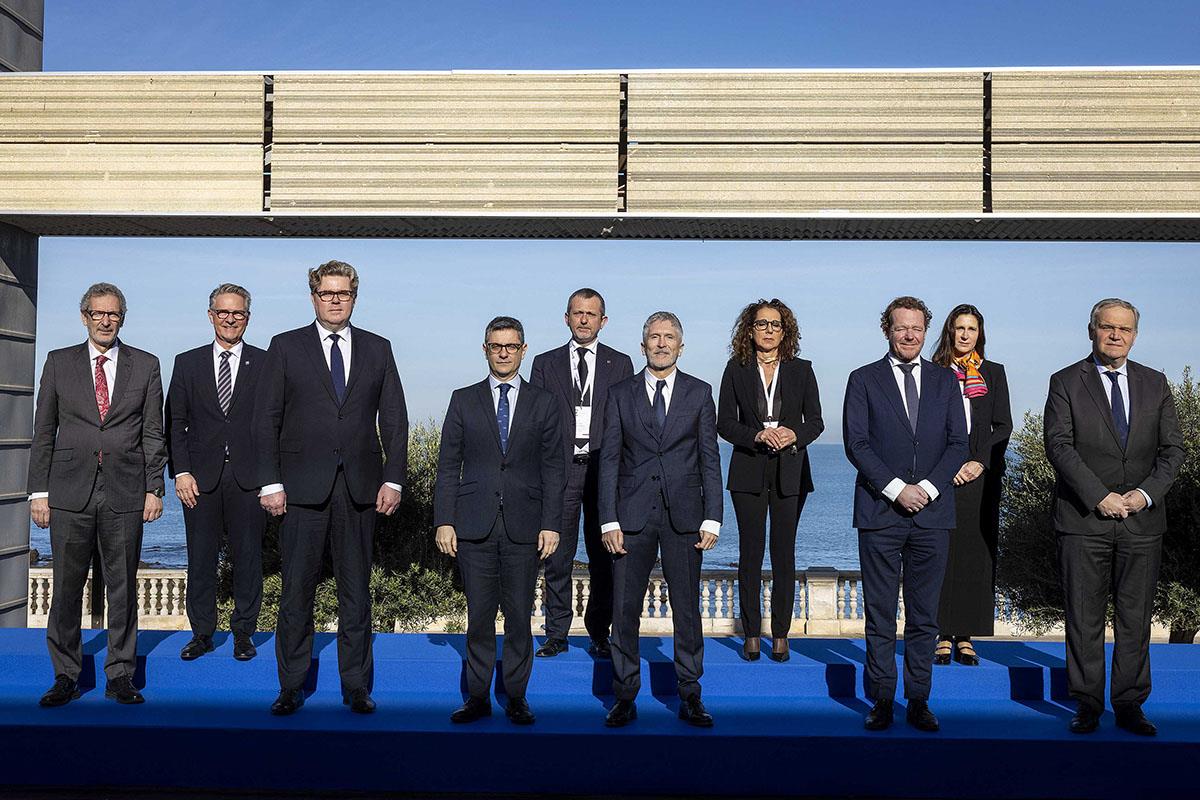Grande-Marlaska and Bolaños present the Campo de Gibraltar special plan to their European counterparts as a "model of comprehensive action" against organised crime
News - 2025.2.14
 The Minister for Home Affairs, Fernando Grande-Marlaska, and the Minister for the Presidency, Justice and Parliamentary Relations, Félix Bolaño, together with their European counterparts
The Minister for Home Affairs, Fernando Grande-Marlaska, and the Minister for the Presidency, Justice and Parliamentary Relations, Félix Bolaño, together with their European counterparts
The two ministers shared the experience of the Campo de Gibraltar Special Security Plan, which they described as "a model of comprehensive action" against serious crime and drug trafficking, and "an example of institutional coordination".
During the fourth ministerial meeting of the coalition, held in Cadiz, ministers presented the details of the special plan and its evolution since 2018 to the home office and justice representatives of Belgium, France, Germany, Italy, the Netherlands and Sweden. The meeting was attended by the Dutch Minister for Justice and Security, David Van Weel, the Swedish Minister for Justice, Gunnar Strömmer, and the French Minister for Home Affairs, François-Noël Buffet.
Grande-Marlaska highlighted the investments in technological resources, which he put at more than €156 million in six years, the reinforcement of police officers and the institutional coordination between bodies and administrations as key elements in the results obtained. "We have re-established the principle of authority and the evolution of the crime rate downwards, and the figures of operations, seizures and arrests endorse the police, judicial and investment effort made since 2018," he said.
"Joint action between Justice and Home Affairs has been and is essential to ensure the swift processing of judicial proceedings," added the Minister for Home Affairs. Grande-Marlaska also recalled the inter-institutional collaboration "and the concerted action with the investigation units of the Tax Agency, the Labour and Social Security Inspectorate, and the local and regional administrations".
For his part, Minister Félix Bolaños highlighted the success of the implementation of the plan in the area of Justice, with an investment of more than €900 million, the creation of 15 new judicial units and the incorporation of new prosecutors (10% of the new posts created in 2024 have been assigned to Cadiz).
He also recalled that, with the setting up of the Asset Recovery and Management Office in Algeciras, €6 million have been recovered and reinvested in the fight against organised crime and the care of victims. Bolaños reiterated that strengthening cooperation between countries is fundamental to respond effectively to this threat, given that the criminal organisation has no borders.
Joint declaration
The 4th ministerial meeting of the Coalition of European Countries against Organised Crime ended with the adoption of a joint declaration urging the European Commission to intensify security cooperation with Latin America, the Caribbean, the Western Balkans and Africa, "as important transit centres for drug trafficking to Western Europe".
The text calls for "broad attention to be paid to cooperation with third countries" and calls for their needs to be considered in the EU's new multiannual financial framework, and for "sufficient funds" to be set aside for the 27 member states to "implement concrete and operational cooperation with the authorities" in these regions.
In addition to this cooperation, the declaration sets out recommendations by the seven countries for inclusion in the future EU Internal Security Strategy, in the areas of prevention, money laundering, information exchange and logistical hubs, "from a comprehensive approach" and "with the aim of reducing the influence of criminal networks and dismantling them, arresting and convicting the perpetrators and confiscating their illicit assets".
On prevention, coalition ministers call for concerted efforts to prevent criminals from obtaining government contracts, subsidies or permits to engage in commercial activities "that could conceal or launder illicit profits" or facilitate their infiltration in legal business structures.
The coalition warns of the risk of financing criminal networks, advocating the strengthening of cooperation within the EU in the areas of confiscation investigations, and involving countries' financial investigation units to combat money laundering.
The declaration also promotes "lawful and effective" law enforcement access to data as a necessary means to achieve "effective law enforcement". It advocates public-private partnerships and encourages service providers to cooperate with public authorities within the legal framework, "to contribute to the protection of society".
The coalition also underlines the importance of logistics centres in the fight against drug trafficking and dedicates a specific section to port facilities, urging the European Commission to actively support the development of the European Ports Alliance, created in 2024, to provide major maritime logistics hubs with better protection against organised crime.
Non official translation




